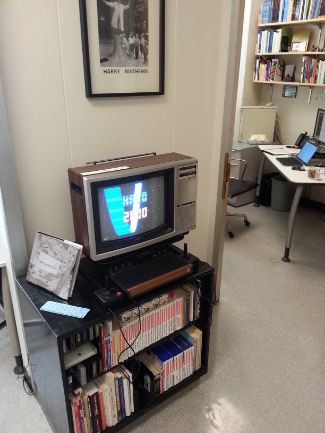Palindromes Win at SymmyS Awards
Shock as First-time Writer Takes Grand Prize With Serious Message On Pill Addiction; Discovered Via Tweet
PORTLAND, OR – FOR IMMEDIATE RELEASE, March 11, 2013.
Aric Maddux of Indianapolis, Indiana won the Grand Prize for Best Palindrome at
the 2012 SymmyS Awards Sunday night with the first palindrome he ever wrote.
His winning entry, a rare “word-unit palindrome,” was a dark warning about the
dangers of prescription pill addiction:
“You swallow pills for anxious days and nights, and days, anxious for pills, swallow you.”
Maddux, a computer technician and poet, tweeted his debut effort to Professor Nick Montfort of M.I.T.,
who took fourth place in Will Shortz’ World Palindrome Championship last year. Montfort, recognizing
Maddux’ talent, nominated the beginner for the SymmyS – and then lost to him in the finals.
Any Ymmy Award (the singular of SymmyS) was awarded in four categories — Short, Long, Poetic, and
Word-Unit Palindromes – in addition to the Grand Prize for Best Overall Palindrome.
Maddux spoiled an otherwise dominating night for Australian Martin Clear, who won the Long
Palindrome YmmY outright, tied for first in Poetry, and placed second in both Short and Long
Palindromes. He wrote fully 10 of the 40 total finalist entries, spread among all four categories. Clear’s
short palindrome, which came within half a point of winning that division, dipped into pop culture:
“I made Rihanna hirsute, familiar, frail: I’m a fetus Rihanna hired, am I?”
Popular author Jon Agee (“Go Hang A Salami, I’m a Lasagna Hog”) won first and third place in Short
Palindromes, scoring with both “A Slightly Violent To-Do List” and this “Igloo Dialogue:”
“’An igloo costs a lot, Ed!’
‘Amen. One made to last! So cool, Gina!’”
Statistics professor John Connett, of the University of Minnesota, took both 3rd and 2nd place in the
Word-Unit category with an unprintable entry and with this epigram:
Fishing for excuses? No need. You need no excuses for fishing.
A word-unit palindrome is one where entire words reverse, instead of individual letters. The motto of
the Three Musketeers — “One for all, and all for one!” – is a famous example. “Surprisingly,” Saltveit
noted, “the fiercest competition was among the word-unit palindromes. Before this competition, they
did not get a lot of attention. Nick Montfort has worked hard to popularize them, and it ended up
costing him an Ymmy.”
The Symmys are produced by The Palindromist Magazine, the world’s leading palindrome periodical.
Hundreds of entries were assembled from direct submissions to the magazine as well as a worldwide
search for new talent. Competitors hailed from Australia, the United Kingdom and the U.S.
“We created these awards to showcase the great new palindromes being written every year,” explained
to Palindromist Editor Mark Saltveit. “Many people think all the good palindromes were written years
ago. These great new works show how wrong that is. And word-unit palindromes are a good way for a
beginner to get involved, as Aric showed tonight.“
The night’s biggest controversy involved the disqualification of an entry. A little-known article in a 1984
issue of Word Ways magazine was found to have a palindrome very similar to a Short Palindrome
contender by the little-known Anne Tenna.
“Ottoman Empire: We Rip Men!” (a motto)
Tenna’s entry was leading the category and in second place for the grand prize at the time of its
disqualification. “No one is suggesting plagiarism,” noted Palindromist Editor Mark Saltveit. “The
earlier palindrome was very obscure, and parallel invention is not uncommon. But we hold the highest
standards for originality, and this entry had to be withdrawn.” Tenna nonetheless tied for first place in
the Poetry category, and had four nominations total.
The ceremony, held at Portland, Oregon’s Funhouse Art and Beer Cabaret, featured Los Angeles
comedian Dax Jordan, star of the upcoming show DaxTV on the MavTV network, and tap dancing
saxophonist Michael “Shoehorn” Conley. Both added original palindromes, written for the occasion, to
their performances.
The panel of judges was a murderer’s row of wordplay and geek celebrities, including puzzle master Will
Shortz, “Weird Al” Yankovic, comedian/author Demetri Martin, comedian Jackie Kashian, musician John
Flansburgh, journalists Jack Rosenthal and Ben Zimmer, and palindromists Tim Van Ert and Jeff Grant.
——————————————————————
Full details are available on the website of The Palindromist Magazine, including:
Biographies and photos of the contestants; Biographies and photos of the judges; A full list of winners;
and A full list of the nominated palindromes (10 in each of four categories).





